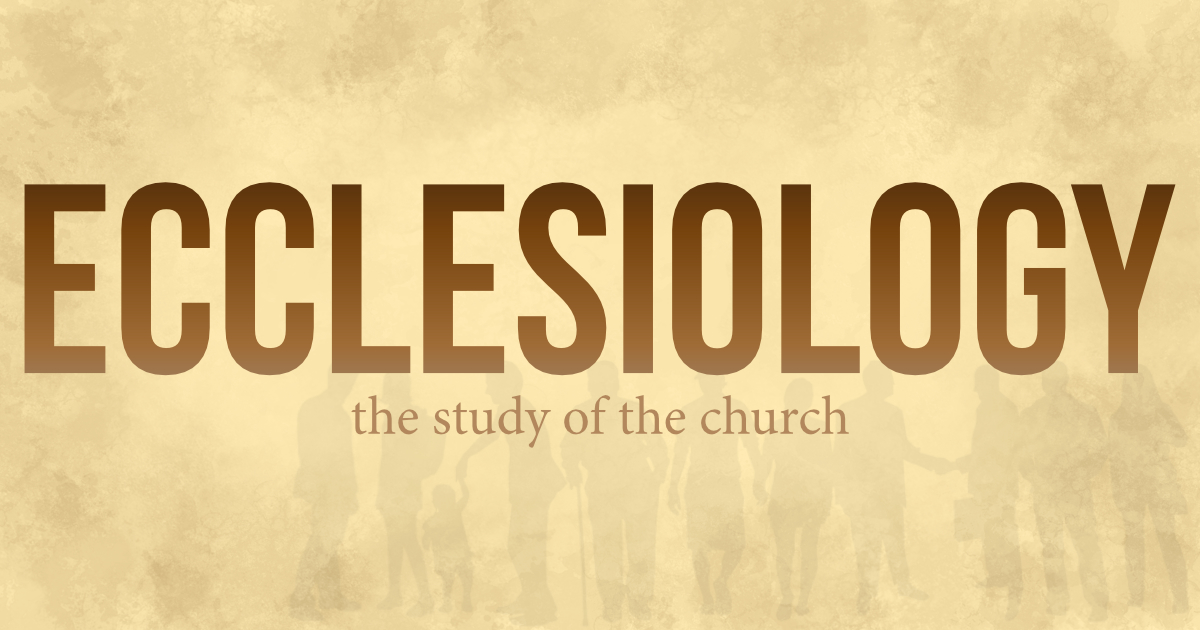 Ecclesiology is the study of the church. This comes from the Greek word ekklesia. In ancient times, this term was used to describe town gatherings (see this usage in Acts 19:32). A town herald would “call out” that there was going to be a town meeting. This was an assembly, gathering, or ekklesia (ek meaning “from” and kaleo meaning “to call”). The English word “church” does not come from ekklesia, but from the word kuriakon, which means “dedicated to the Lord.” This word was commonly used to refer to a holy place or temple. By the time of Jerome’s translation of the NT from Greek to Latin, it was customary to use a derivative of kuriakon to translate ekklesia. Our word church probably comes from the German word kirke, which was their translation of kuriakon, so it would be normal to understand the word church as a building.
Ecclesiology is the study of the church. This comes from the Greek word ekklesia. In ancient times, this term was used to describe town gatherings (see this usage in Acts 19:32). A town herald would “call out” that there was going to be a town meeting. This was an assembly, gathering, or ekklesia (ek meaning “from” and kaleo meaning “to call”). The English word “church” does not come from ekklesia, but from the word kuriakon, which means “dedicated to the Lord.” This word was commonly used to refer to a holy place or temple. By the time of Jerome’s translation of the NT from Greek to Latin, it was customary to use a derivative of kuriakon to translate ekklesia. Our word church probably comes from the German word kirke, which was their translation of kuriakon, so it would be normal to understand the word church as a building.
Unless sound ecclesiology is taught and explained often, many believers raised on a formalistic paradigm will never out of it, and they will push for practices or views in the Church. This needs to be resisted in favor of the biblical teaching on what the Church really is and can be.
Articles on Ecclesiology
What is the Church? The English word “church” does not come from ekklesia, but from the word kuriakon, which means “dedicated to the Lord.” This word was commonly used to refer to a holy place or temple. By the time of Jerome’s translation of the NT from Greek to Latin, it was customary to use a derivative of kuriakon to translate ekklesia. Our word church probably comes from the German word kirke, which was their translation of kuriakon, so it would be normal to understand the word church as a building.
Church Polity: Church polity refers to the government of the church (e.g. “political” or “politics”). How should the church be governed? Should we have leaders over the church, and if so, what should be their limits to authority? This subject is incredibly important because of the fact that God’s work could be hindered or encouraged depending on where we stand on this subject. Church polity is generally conceived of in three separate models: (1) Episcopal, (2) Presbyterian, and (3) Congregational.
Apostolic Authority: The Greek word apostolos simply means “messenger.” But while this term is used in a broad sense in the NT, it is also used in a very specific sense. That is, there was a closed fraternity of apostles in the first-century that do not exist today.
High Dedication Ethos: Are highly dedicated churches biblical? Are high standards for churches antithetical to a grace-based community?
What is Worship? New Testament (NT) worship is highly contested in the church today. As biblical Christians, we should create our definition of worship from the Bible itself—not our church tradition.
Evangelism: The term “evangelism” comes from the Greek word euangelion, which means “good news.” It is a compound word in the Greek (eu means “good” and logeo means “word”). Therefore, evangelism is the subject of sharing Jesus’ message of love and forgiveness with people who do not know him yet.
Discipleship: Personal discipleship is one of the keys to a thriving and energized church. While we are all disciples of Jesus, the Bible also teaches that we should look to spiritually mentor younger Christians, and equip them to do important spiritual work.
Character and Leadership: What does it take to be a spiritual leader? This article explains the importance of character in Christian leadership.
